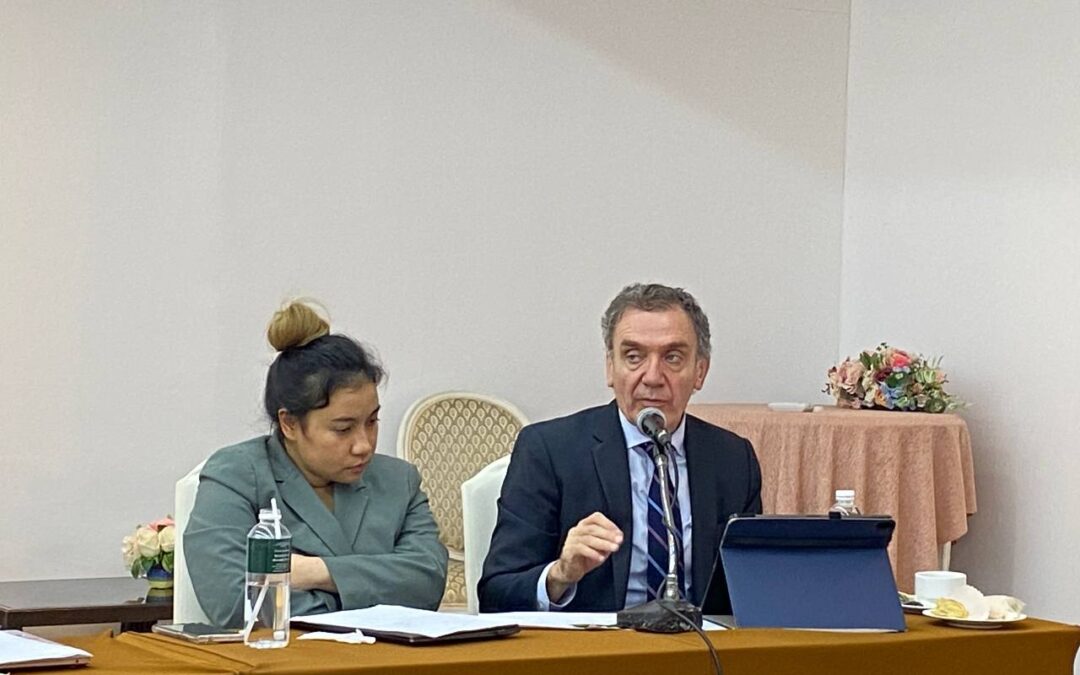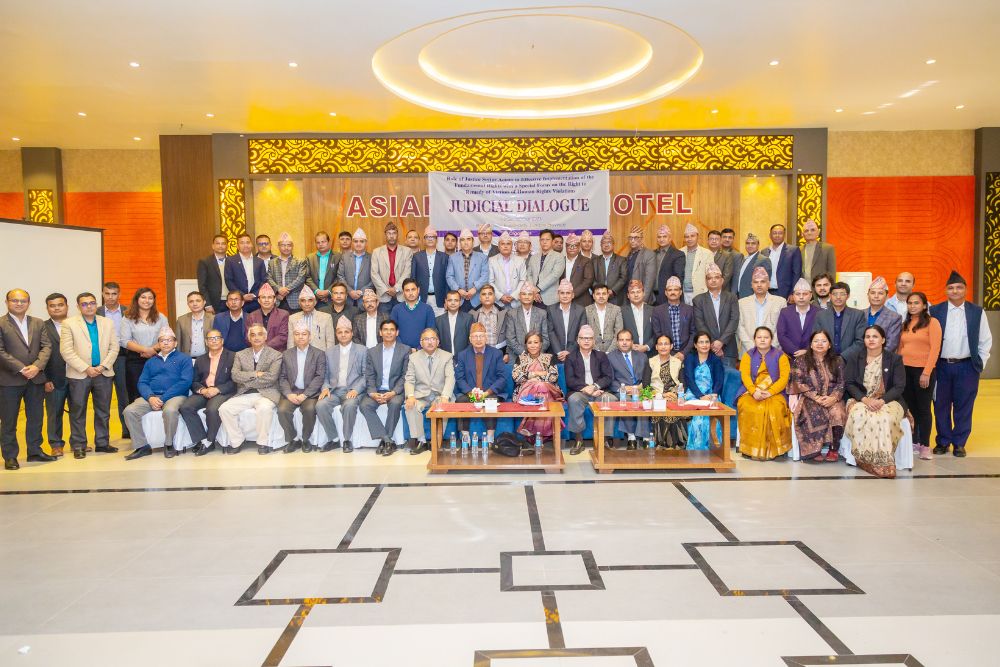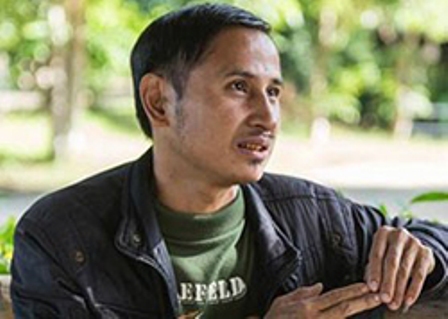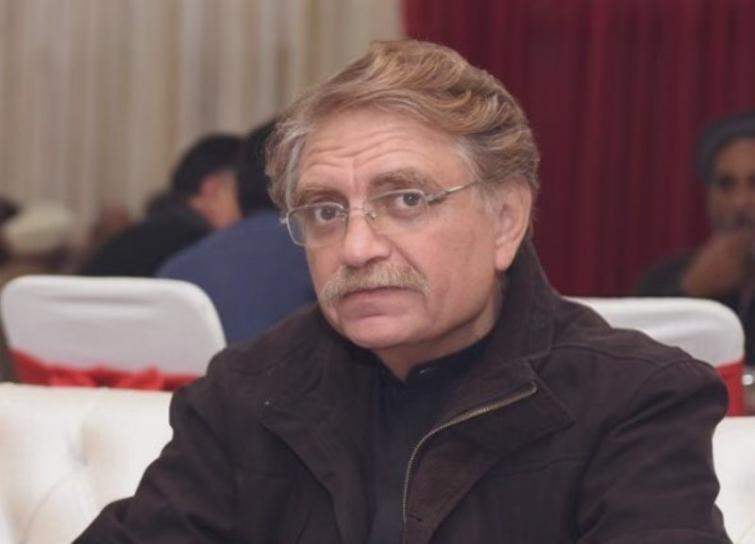
Nov 30, 2023 | Events, News
On 29 November 2023, the ICJ co-hosted a dialogue among Thai lawyers, academics, and Santiago A. Canton, Secretary General of the ICJ to exchange best practices from Latin America, specifically focusing on insights from the Inter-American Court of Human Rights and domestic courts in the region – to address ongoing challenges in litigating cases involving suspected enforced disappearances within Thai courts.
The Dialogue involved challenges encountered in litigating cases of enforced disappearances, particularly in terms of accessing, collecting, and admitting evidence within Thai courts. These challenges are notably complex, especially when the crimes have occurred beyond Thailand’s borders.
Additionally, participants discussed the difficulties related to establishing the responsibility of individuals for these serious crimes and how courts have handled evidence submitted in previous enforced disappearance cases. This included instances where evidence, such as telecommunications, as well as various forensic evidence like biological evidence and DNA evidence, was dismissed, and the failure to identify the perpetrator in cases where the victims’ bodies or remains could not be located.
“The crime of enforced disappearance completely eradicates any trace of the victim, with no acknowledgment by the authorities and no effective investigation. The requirement to locate the disappeared individuals’ bodies and remains contradicts the very nature of the crime of enforced disappearance,” said Santiago A. Canton, Secretary General of the ICJ.
While highlighting that the criteria for evaluating evidence within the Inter-American Court of Human Rights (IACtHR) are less formal compared to domestic criminal legal systems, Canton noted IACtHR’s jurisprudence relevant to the admissibility of circumstantial and indicative evidence, which was particularly instructive as enforced disappearances typically involve deliberate attempts by state officials to destroy direct evidence, aimed at securing impunity.
“The standard of proof in the Inter-American Court of Human Rights allows lawyers, under certain circumstances, to only establish a demonstrable ‘practice’ of enforced disappearances at the time of a specific case. When combined with circumstantial evidence, this can result in a judicial presumption of enforced disappearance,” said Canton.
Participants also discussed the ‘continuous nature’ of enforced disappearance crimes, which are recognized under Thai law and enable cases from the past, where the fate and whereabouts of victims remained unknown, to be prosecutable before the court, notwithstanding the fundamental principle of non-retroactivity.
Closing remarks by Angkhana Neelapaijit, a Member of the UN Working Group on Enforced or Involuntary Disappearances, whose husband Somchai Neelapaijit was a victim of enforced disappearance, detailed the role of the Working Group and the steps taken globally to address the crime.
Background
More than 20 Thai experts, lawyers, and academics, who represent or have experience researching cases of enforced disappearances in Thailand, participated in the discussion.
Thailand’s Act on Prevention and Suppression of Torture and Enforced Disappearance became effective in February 2023. However, its implementation has been slow. The majority of cases involving suspected torture, ill-treatment, and enforced disappearances are still in the investigation phase, and not yet moved into the adjudication phase. Limited information about its progress has been made available to the public.
Prior to the enactment of this new law, only two cases of apparent enforced disappearances reached Thai courts: the case of prominent Muslim lawyer Somchai Neelapaijit and Karen activist Pholachi ‘Billy’ Rakchongcharoen. Unfortunately, these cases concluded with limited success, mainly due to challenges surrounding the evidence submitted to the court.
Contact
Sanhawan Srisod, ICJ Associate International Legal Adviser, e: sanhawan.srisod@icj.org
Further reading
Thailand: a report on the criminal trial and investigation of the enforced disappearance of the Thai human rights lawyer, Somchai Neelapaichit
Ten Years Without Truth: Somchai Neelapaijit and Enforced Disappearances in Thailand

Jan 27, 2023 | News
Judges and prosecutors in the province of Lumbini, where a high number of cases involving extra-judicial killings and enforced disappearances from 1996-2006 have been filed, pledged to enhance their efforts to ensure access to justice for victims/survivors, as they concluded a two-day judicial dialogue with several justices of the Supreme Court of Nepal.
The judicial dialogue was organized by the International Commission of Jurists (ICJ) and its partner, Advocacy Forum Nepal (AFN), in collaboration with the Judges Society Nepal (JSN), on 1 – 2 December 2023. More than 50 Judges and prosecutors working at the provincial, district and local levels in Lumbini, identified ongoing challenges faced by victims and survivors of violations and abuses during the 10-year internal armed conflict. They jointly evaluated the progress of Nepal’s transitional justice process, applying national and international law and standards, including Supreme Court directives and international best practices.
Participants highlighted the roles and responsibilities of jurists in the ordinary justice system in delivering justice in conflict-era cases involving allegations of gross human rights violations and abuses and the persistent obstacles. In discussing the role of the courts, the police and prosecuting agencies in dealing with such cases, participants expressed concern about the serious and unwarranted delay in the establishment and operation of Nepal’s transitional justice arrangements, which includes the failure to amend them in accordance with country’s international legal obligations .
All major political parties over the many years have promised to ensure justice for victims/survivors of gross human rights violations and abuses during the conflict, and judgements from the Supreme Court have affirmed Nepal’s legal obligations to establish an effective system for access to justice, in accordance with international and domestic law. Nonetheless, victims/survivors have been waiting for over 17 years for reparation. To make matters worse, they continue to be denied redress through the regular justice system on the pretext that they will be provided access to effective remedies through a separately created transitional justice process.
ICJ Commissioner, and former Chief Justice of the Supreme Court of Nepal, Kalyan Shrestha, emphasized that Nepal’s approach to transitional justice must be guided by the jurisprudence of the Supreme Court, which is grounded in international human rights law and domestic law. He stressed that alleged perpetrators of gross human rights violations and abuses constituting crimes under international law must not be exempted through grants of immunity.
“As justice actors, we should overcome difficulties using our creative judicial mind to address challenges in pursuit of dispersion of justice. Also, we should not be complaining about the ‘State’ but rather making best efforts to accomplish tasks entrusted within us using our creative faculties and knowledge,” stated ICJ Commissioner Shrestha, during his keynote speech.
Justice Sapana Pradhan Malla of the Supreme Court of Nepal underscored the importance of adopting an approach whereby the justice sector not only prioritizes delivering justice in the cases brought before it, but also takes steps to ensure that the system is accessible to all victims seeking legal remedies. Justice Ananda Mohan Bhattarai of the Supreme Court of Nepal emphasized the importance of resolving an estimated 1000 cases brought by victims/survivors and their families, which are currently pending before various courts, the police and government attorney offices throughout country.
Mandira Sharma, ICJ Senior Legal Advisor, provided insights into the global context of transitional justice and discussed the challenges, lessons learned, and best practices. She noted that Nepal’s Parliamentary Sub-Committee, tasked to make necessary changes in the TRC Act Amendment Bill, had not yet addressed the most significant concerns put forward by victims/survivors and civil society, including the provisions that may effectively provide amnesty to perpetrators of human rights violations and abuses.
Participants appreciated the conceptual clarity provided by the judicial dialogue and the encouragement that they received from the Supreme Court justices on how to approach such cases.
This judicial dialogue is one in a series of several judicial dialogues being organized by the ICJ and its partners with judges and public prosecutors across the country.
Contact:
Mandira Sharma, ICJ Senior International Legal Adviser, t: +9779851048475, e: mandira.sharma@icj.org
Kashiram Dhungana, ICJ National Legal Adviser, Nepal, t: +9779851226964, e: kashiram.dhungana@icj.org

Aug 18, 2022 | News
The indictment of Chaiwat Limlikit-aksorn, former chief of Kaeng Krachan National Park, and three other park officials for the premeditated murder of Karen activist Pholachi “Billy” Rakchongcharoen that was announced on 15 August 2022, is a welcome step towards justice, said the International Commission of Jurists (ICJ) today.

Jun 30, 2022 | News
Thailand’s Senate must pass a draft law that would criminalize enforced disappearances and do more to put an end to such violations, international experts and Thai human rights defenders urged at a workshop co-hosted on 30 June in Bangkok by the International Commission of Jurists (ICJ) and Thailand’s Ministry of Justice.

Feb 2, 2021 | News
The ICJ today denounced the decision by Pakistani authorities to conduct the trial of Idrees Khattak, a leading human rights defender, in a military court.
Idrees Khattak is charged with “spying” among other offenses, related to his monitoring of violations by military forces in 2009. He was forcibly disappeared by the Pakistani Military Intelligence in November 2019. His whereabouts remained unknown until June 2020, when military authorities informed the Commission of Inquiry on Enforced Disappearances that he was being tried under the Official Secrets Act, 1923.
The Peshawar High Court yesterday dismissed a petition challenging the jurisdiction of the military courts in this case. Under international standards, including the International Covenant on Civil and Political Rights to which Pakistan is a party, civilians such as Idrees Khattak must not be subject to the jurisdiction of military tribunals.
“Idrees Khattak was subjected to the serious crime of enforced disappearance and instead of bringing the perpetrators of this violation to account, the Pakistani military has kept him arbitrarily detained and is now violating his rights further by subjecting him to a military court,” said Sam Zarifi, ICJ’s Secretary General.
“The Pakistan government must immediately release Idrees Khattak. If there is real and credible evidence implicating him in a cognizable crime, he should be tried by a civilian court and his right to a fair trial should be fully respected,” said Zarifi
The ICJ has found proceedings before Pakistani military courts fall well short of national and international laws requiring fair trials before independent and impartial courts:
- Judges are part of the executive branch of the State and continue to be subjected to military command;
- The right to appeal to civilian courts is not available;
- The right to a public hearing is not guaranteed;
- A duly reasoned, written judgment, including the essential findings, evidence and legal reasoning, is denied; and
- The death penalty may be implemented after unfair trials.
Idrees Khattak has been charged on multiple counts related to spying and other conduct “prejudicial to the safety or the interests of the State” under Section 3 of the Official Secrets Act as well as section 59 of the Pakistan Army Act, 1952. The Pakistan Army Act gives military courts jurisdiction to try civilians for certain offences under the Official Secrets Act.
The alleged conduct for which Idrees Khattak has been charged dates back to July 2009 – ten years before his enforced disappearance.
A group of 10 independent experts appointed by the UN Human Rights Council have characterized Idreek Khattak’s case as “emblematic of a series of documented enforced disappearances in Pakistan, where many human rights defenders are similarly silenced for their legitimate work of monitoring, documenting and advocating against a range of human rights violations and attacks against minorities.”
The ICJ calls on Pakistani authorities to immediately release Idrees Khattak.
The ICJ also calls on Pakistani authorities to ensure military courts only have jurisdiction to try military personnel for military offences and to bring procedures of military courts in conformity with international standards.
Contact
Sam Zarifi, ICJ’s Secretary General, sam.zarifi(a)icj.org
Reema Omer, ICJ’s Senior International Legal Advisor (South Asia), reema.omer(a)icj.org
Additional information
In July 2017, in its Concluding Observations after Pakistan’s first periodic review under the International Covenant on Civil and Political Rights (ICCPR), the UN Human Rights Committee stated that it was concerned by the jurisdiction of military courts over civilians and allegations of fair trial violations in military courts’ proceedings.
The Human Rights Committee recommended that Pakistan “review the legislation relating to the military courts with a view to abrogating their jurisdiction over civilians and their authority to impose the death penalty” and “reform the military courts to bring their proceedings into full conformity with articles 14 and 15 of the Covenant in order to ensure a fair trial.”









